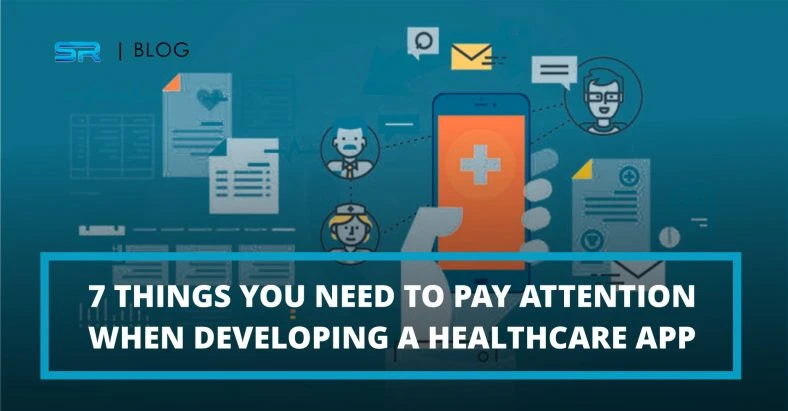7 things you need to pay attention when developing a healthcare application

Healthcare software and app development become more widespread and complicated. The number of users and apps is growing rashly. It is predicted that this sphere brings almost $50B in 2020. With the business growth to create a successful health app, you should make everything to satisfy the clients' needs and find customized solutions for them.
The mobile and full medicine apps are often applied approximately 1-3 times per 1-4 days by ordinary users and constantly by medical advisors. The health app development is a beneficial monetization prototype. The development of the healthcare app demands a special way of working and some preparations beforehand. Only, in that case, you will be sure that the solution is appropriate for your client/patient. Below some features will be presented which are important for developers to keep in mind while creating an app or software.
Kinds of apps
Before we go into details in all innovative solutions of innovative hi-techs, let's observe some types of healthcare app built for different goals and client cases:
Patient info control software
This software includes electronic health records, the info software for medical advisors, and integrated systems for patient data management. This specialized software is created to transfer the info from one network to another one. In prospect, a doctor may look at the previous patient's medical info to understand the current symptoms of the patient and provide it for other specialists.
Software for patient analysis and info
It is created for controlling remote patients. Remote patient checking is an approach where the doctors may track the patients after their hospital discharge. Wearable apps examine can send signals to doctors if the patient is in trouble and needs to be hospitalized. The software which helps to support the medical decision may save life on time if it is applied right.
Hospital software or application
This type of apps may deal with financial manipulations that ease the working routine of medical staff. With such software, the operations are performed quickly and the patient may do the money transfer any time they prefer. Such a network type of app may connect the doctors and other medical software, for example with innovative hi-tech VR and AR, to assist medical advisors in their practice.
Apps for patient health
This kind of apps focuses on self-care about health and checking the condition of the body. The patient can use these apps to count calories, track a distance of walking. Type is the most popular app in the world.
Hi-tech applied for developing healthcare apps
Artificial intelligence
AI and ML are also implemented in the creation of healthcare apps/software. They help medical advisors to make a diagnosis, building on their solutions on their previous experience. The doctors may predict the possible symptoms and consequences. Sometimes the machine can make a better decision about the patient diagnosis than the professional doctor.
Virtual and Augmented Reality
These modern technologies are applied in the healthcare sphere. The possibilities of VR and AR help doctors experience the cases and anatomy of patients by sitting in the office. The innovative hi-tech allow to notice the difference between the norms and case of the patient and find the problems before it becomes more serious. The virtual surgical operations are also possible by using VR and AR.
Blockchain
Medical software that applies the technology gives the highest levels of protection and safety for storing info. Using blockchain hi-tech to keep the patient records from hacking. The system with blockchain may ensure the users that all documents are safe and in a reliable place. The patients may allow only limited number of people to read and observe the records.
Big data
Big data in combination with artificial intelligence and machine learning may save time and money and convert the info and automate complete performance. The advantage of big data applications is to have high-quality work during a health crisis and to find out the solution in emergencies. This technology also helps to improve the research for patients recovering and vaccine findings.
Cloud
The cloud technology advantage while developing the healthcare app/software is the decrease in price. This innovation helps to store the medical records for the patient, who are in hospitals or clinics. The copies of documents have a short time to be used. This approach seems easy and safe. Some operations may be performed automatically.
Cloud hi-tech healthcare software is reliable for any user, who uses it. The creation and manipulation of such type software are more effective if the content is delivered regularly in the cloud space.
Functions used for healthcare app development
Well, having known some kinds of healthcare apps, let's observe what specialized functions you can use for making app effective and competitive.
Video meeting in healthcare
This function eases the process of discussion between doctors and patients. The feature becomes more popular and called telemedicine. These types of apps help the patient to take immediate consultation. Doctors may apply them as a source of connection with other colleagues. Any decease may be diagnosed on time even if the doctors and patients are in different places.
Internet of things
This feature is effective while controlling the patient's condition and supporting the working process of medical equipment in the current time. With the help of IoT, doctors can monitor patient's health constantly. The technology is also implemented to check the quality of medical equipment performance. The sensors of the Internet of things may predict the failure of medical machines and warn about the error beforehand.
The detailed structure of healthcare app development
Some classic steps are presented below to describe the development of app even in the healthcare sphere. Finding the solution to the problem and have the goal audience. When the expert is looking for the medical solution they know what precise goal is. The aims of the apps may be the following: The close communication between doctors and patients, the planning of appointments, parameters of patient analysis, and financial aspects. Whatever the decease is, the developer does everything to attract the audience and make people set up the app. The main thing is to have an easy-to-use app because it fails. Besides, the expert also should know the exact problem the software has. It may vary from the patient's pain level or what kind of people to serve.
Risks and safety
When the app is ready for sale on the market, it should be aware of all state acts concerning the healthcare software or apps. The data of patients is important that why they want to be sure that it keeps safe. It is important to check the state agencies with rules and what way the info is handled before finding the best platform for data storing and sharing.
Receiving the audience
You should understand that the app is a competitive product. Except for the app the market strategy is required. The strategy should include the advertising, analysis of target audience, income levels, and perspectives.
Monetization prototypes for healthcare apps
It is important to estimate how the new app will be profitable. If you want the app is free for the customers, how you are going to take money from it. There is a special set of arrangements that can fix this problem.
Other models of monetization may include the creation of a premium version or special functions for paid versions. There may be also a use of the free version of the app during a particular period of time. The involvement of the audience is a specific art of marketing. It is crucial to make advertising a product in the right way. The developer should think about what prototype of monetization fits the suggested app.
The price of healthcare app
The development of the healthcare app costs approximately $426k from the idea to release. More complex apps cost more expensive. Nowadays the competition is growing extremely quickly. Before the planning, try to estimate how relevant the app will be. But there is also a big necessity to create the healthcare app for patients and doctors, where the medicine software may solve different problems which people health faces.
Our Servreality company developers have deep experience in the creation of healthcare software with special research and realization of industry specifications. Any type of project will improve the quality of the healthcare industry and human life, that people constantly use.
Advantages of healthcare apps
It is significant to keep in mind the strong aspects of healthcare app creation and which feature you need.
Advanced efficiency
Surely, the performance is improved when the workflow betters due to automated services and some ordinary actions. Doctors may deal with an app instead of working with a lot of documents.
Software with spared time
Medical advisors may connect with patients precisely by healthcare app, and it economizes time for all sides. Besides, they also get the info for the software development.
Constant access
Any analysis or info about patient condition is available any time they want. Patients can receive the answers on different important questions applying the created app, communicating with doctors, or checking some documents.
Expenses
The patients can chat with doctors without meeting them personally. It shortens the budget and helps to distribute money correctly.
Productivity
The healthcare workers can use the apps anywhere by mobile devices, they can correct some problems. It is convenient to deal with digital sources instead of documents.
Problems are solved faster
Physicians constantly require a full disease chronicle to make the right diagnosis and the creation of healthcare software/ app helps to support it. The doctors can consult patients on what recommendations they need to get.
Limits
No matter where a patient or a doctor is. There is always a chance to communicate with each other. The only thing is the presence of the Internet.
Big set of features
Relying on the app prototype, patients may examine the lab results, communicate with doctors, check all organism indicators, and others. The healthcare app consists of many capabilities and developers will implement everything that is required.
Features of healthcare apps
And now we should observe the last thing you need to pay attention and this is the features of the healthcare app. Some innovative healthcare trends may be so useful for developing your app and its improvement.
Geolocation
This function helps patients to find the nearest clinics or hospitals to get consultation or help in the emergencies. The one thing is needed: the API of any map service.
Current conversation
It is the best way to implement a real-time conversation in the app and thereby let patients chat with doctors without troubles. Additionally, our ServReality team is always ready to implement different features for your app including this one. It saves time and money while creating your healthcare application.
Push notifications
All notifications appear on the screens of devices and users can find something new or useful.
Evaluations
If healthcare companies recommend their staff, patients can choose a specialist who is competent in the question the patient has.
Sign-in process
The registration system should be easy to use. The sign-in through social media account must be possible because it is convenient and quick as possible.
You should realize that the user guide for healthcare app development is not complete and can have a continuation. Every app has its unique peculiarities. That's why it is crucial to realize what you need and tell the developer about it.

